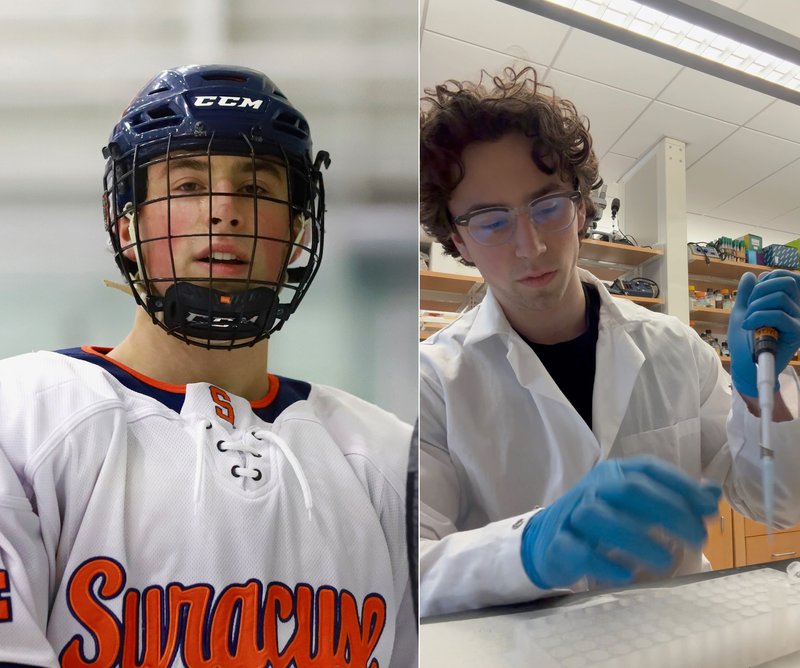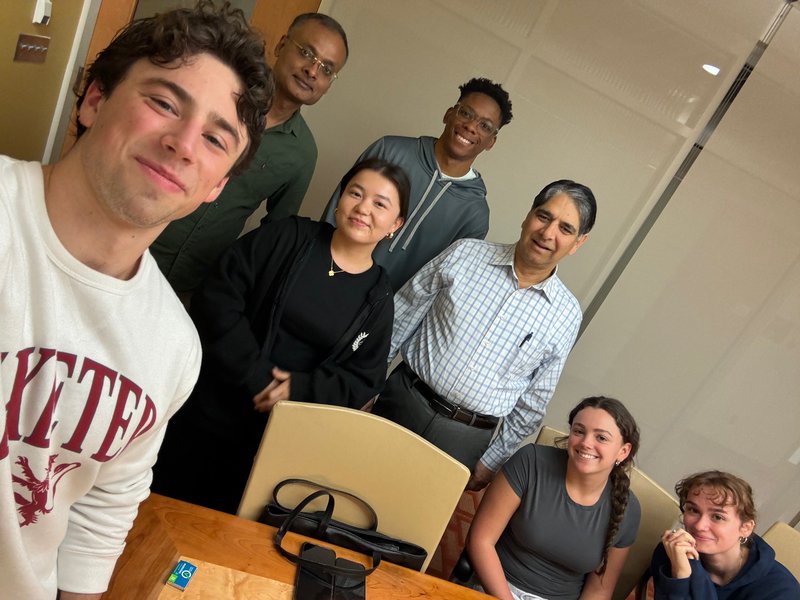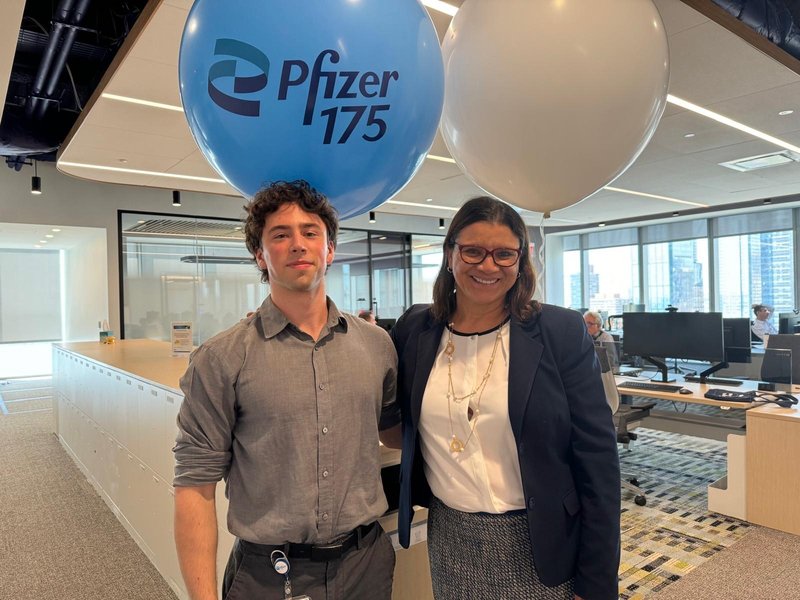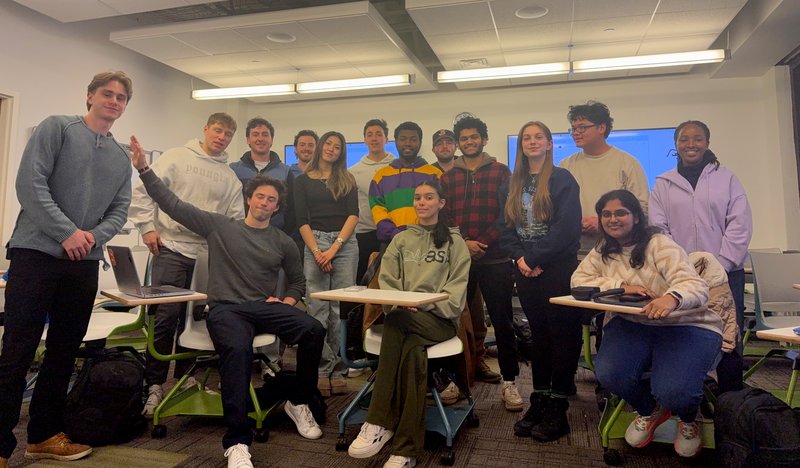With climate change and severe weather expected to intensify in the coming years, developing strategies for a resilient food supply is crucial. This involves understanding and developing crops that can withstand pathogens that cause diseases, one of the key areas of biotechnology research at the College of Arts and Sciences (A&S). Combining biology, chemistry, physics, mathematics, economics, business and engineering, the biotechnology program is helping find practical solutions to solving the challenges facing our food supply, global health and the environment.
A&S students like Isaac Arnold '26 are already finding numerous opportunities to address these important questions.

Junior Isaac Arnold is exploring every side of the Syracuse University experience, engaging in cutting-edge plant biology research, developing entrepreneurial ventures and excelling on the ice rink in his free time.
Making an Early Contribution
Arnold, originally from Halifax, a small city in Nova Scotia, Canada, had never heard of biotechnology before coming to Syracuse. Initially declaring as a biochemistry major, Arnold was intrigued by the cutting-edge aspect of biotech and its broad, practical applications after learning about the field of biotechnology from his biology professor and now mentor, Ramesh Raina.

Isaac Arnold (left) with Professor Ramesh Raina (third from right) and members of the lab group.
Since joining Professor Raina's lab, Arnold recently co-authored a study in the journal Molecular Plant-Microbe Interactions, which explored how a set of genes (GATA21 and GATA22) are involved in regulating pathogen defense response in a plant called Arabidopsis.
“Humans share much of their genome with plants, which is why a lot of research done in the plant biology sphere is also relevant medically,” says Arnold. “We study the effects of epigenetic modifications, which are essentially reversible changes to regulate gene expression. Our research focuses on disease resistance—specifically, identifying which genes in plants regulate resistance to disease, and understanding the trade-offs involved.”
In their recent publication, the team found that GATA21 and GATA22 proteins positively regulate defense against fungal pathogens while acting antagonistically against bacterial pathogens. By understanding the mechanisms regulating these processes, researchers can develop strategies for producing crop plants with enhanced resistance against pathogens.
A key contribution by Arnold to this study stems from his long-standing interest in computer coding. In addition to assisting with the scientific research and publication writing, he developed image analysis software used during the study.
“It was inspiring to work closely with such a smart and driven team. They taught me everything I needed to know, helping me understand exactly how to utilize my skill set,” he says. “I gained a lot of great mentors through this, made tons of connections and it was just an overall amazing experience.”
Raina, professor and executive director of the biotechnology program and co-author on the study, says that Arnold's efforts have significantly enhanced the research output of his lab.
“In addition to making some very interesting scientific observations, Isaac's coding enabled us to rapidly analyze large datasets," notes Raina. "His work not only contributed to our most recent publication but will also be instrumental in analyzing data for several upcoming manuscripts. Isaac is an incredibly intelligent, creative and resourceful student who consistently thinks outside the box.”
Finding Purpose at Pfizer
Beyond his research contributions at Syracuse, Arnold has enhanced his career readiness through internship and entrepreneurial opportunities tailored for biotechnology students. In the summer of 2024, he applied for and secured a position at Pfizer's New York City office, working in the medical affairs department within the emerging markets sector—regions where Pfizer aims to expand its market presence.
“Being from a small city like Halifax, it was a great experience spending my summer living in Manhattan,” he says.

Arnold (left) with Graciela Morales, vice president, Pfizer Vaccines Lead, Emerging Markets at Pfizer’s headquarters in Manhattan.
One of the aspects of the biotechnology major that excited Arnold was the opportunity to make a tangible difference to world health. To that end, his favorite project at Pfizer involved working with the Accord team to deliver much-needed vaccines to people in developing countries at cost (meaning without profit to Pfizer).
Leveraging his computer science expertise, he developed a database that integrates epidemiological publications (having to do with how diseases spread) from major sites into Pfizer's internal system. This database can sort information by country or disease based on prompts and provide relevant details about the side effects of certain diseases, including considerations for patients with conditions like hemophilia or immunocompromised states.
“For a lot of the countries where there's not a lot of publications, it'll give you information from countries with similar demographics. I used a language model to summarize all the main facts into slide decks on command, so if you want South Sudan publications, you type in South Sudan COVID-19 immunocompromised and it would list the most recent and relevant epidemiological data through this database,” says Arnold.
Building on the success of that project, he also created an intern slide deck for Pfizer to provide new interns with essential tools and resources during their onboarding process.
“Being able to create those connections at a major company is unreal,” says Arnold. “Once they see that you care about what you're doing and that you work hard, people really start to respect you.”
Leveraging his connections at Pfizer, Arnold arranged for a company representative to attend the biotechnology conference at Syracuse University on April 5. At the conference, industry leaders networked with students and shared insights into the latest advancements in biotechnology, innovative therapies and industry trends.
Swimming with the Funding “Sharks”
Pushing the boundaries of science and technology to lead to better health outcomes is a hallmark of the biotechnology field. Arnold and a group of his friends at Syracuse have created a platform for students to promote their biotechnology innovations on the world stage. The group recently founded iGem Syracuse, a startup incubator at the University aiming to bring together students from diverse fields to launch a new biotech startup each year and compete at the iGEM Grand Jamboree in Paris, which is attended by over 200 venture capital firms.
“Every single year we'll pick a different project and work with students through all aspects from initial development, brainstorming, idea creation, to the actual wet bench science, which is pretty cutting-edge,” says Arnold.

Members of the iGem team at Syracuse University.
While he can’t talk specifics about the products currently in development, due to confidentiality, he says they have some interesting projects in the medical device and genetics spheres. The goal of this initiative is to create a marketable biotechnology product that could be sold or introduced to the market. This prototype would be showcased at the iGem competition, where biotechnology projects are presented, primarily serving as a platform for investors. If a venture capital firm sees potential in the prototype, they might purchase the idea and scale it up to a market level.
“This initiative could create jobs for students and potentially lead to the formation of a new company,” says Arnold. “It offers significant opportunities both for career advancement and gaining real-life work experience.”
A Busy Schedule Paves the Way for Medical School
Arnold's schedule, filled with internships, 22-credit semesters, research, startups, and some hockey during his free time, sets the stage for his next ambition: tackling the challenges of medical school. What drives him? Passion.

A native of Nova Scotia, Canada, Arnold began playing hockey at the age of two. Before coming to Syracuse, he climbed the ranks of youth hockey, eventually playing for the Halifax McDonald’s U18 team, a premier U18 program in Canada. Now a forward on the Syracuse University men’s hockey team, which competes in the American Collegiate Hockey Association (ACHA), he finds it a great way to balance the demands of his schoolwork.
“I truly love the work,” he says. “I love helping people. I love developing cutting edge technology and working on things that are super interesting and have real-life implications that can make the world a better place.”
By getting used to a busy schedule now, he anticipates managing the demands of medical school while continuing biotechnology entrepreneurial ventures.
"This is my way of unwinding. It's how I take my mind off school,” he says. “I'll always be deeply involved in the biotech industry, no matter where I end up. I love the research and the opportunities it can create for people.”
